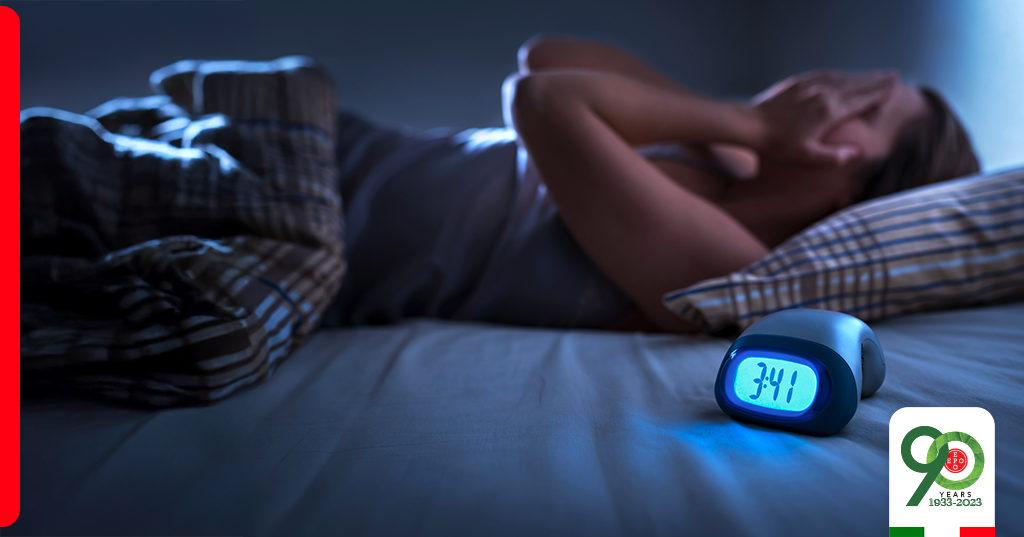
Springtime sleep disorders: from plants a natural help
Springtime arrives, and with the season change, often coinciding with the beginning of summertime (this year on the night between 29 and 30 March), many people report symptoms such as low energy levels, sleep disorders and mood fluctuations: the so-called spring fatigue syndrome. According to the Italian Association of Sleep Medicine (Aims), 12 million Italians would experience sleeping problems, 30% of whom sleep less than 6 hours a night, while according to a survey conducted by Doxa - AIDEPI Observatory ‘Io comincio bene’, 86% of Italians - 35 million people between the ages of 18 and 70 - suffer psychophysical symptoms from seasonal changes; mainly women between the ages of 35 and 54, with rates of over 90%.
In most cases, these are temporary symptoms, which usually disappear spontaneously, as the body gets used to the new seasonal conditions, indicating no specific pathology. However, such a state can have a significant impact on the quality of life, especially in meteoropathic individuals, both psycho-physically and relationally.
Springtime lethargy?
For the quality of sleep and rest, the arrival of spring can cause some trouble: when the days get longer and temperatures rise, changing the ratio between daylight-darkness hours, not only life habits may change but also the circadian rhythm. It is the ‘internal clock’ that regulates the sleep-wake cycle, the secretion of hormones such as melatonin and cortisol, as well as the variation of body temperature and other parameters related to the circulatory system over a 24-hour period (circadian derives from the Latin ‘circa’ meaning ‘around’ and ‘die’, ‘day’).
The environmental cues that can synchronize the biological clock with environmental changes in ethology are called Zeitgebers (in German, literally ‘time givers’), the most important of which is undoubtedly sunlight.
This explains how the increase in daylight hours can cause sleep imbalances, due to an alteration, at a biological level, in the production of melatonin, the hormone that regulates the sleep-wake cycle; produced by the pineal gland, especially between 2 and 4 a.m., its imbalance has negative effects on both the difficulty of falling asleep and nighttime awakenings. Perturbed sleep, in turn, results in lower performances at work and study and reduced psycho-physical well-being, while mood fluctuations can impact relational life. In some predisposed individuals, sleep disorders can also cause disabling migraines.
How to regain the right balance?
A healthy lifestyle is particularly recommended at this time of the year: maintaining regular bedtime and waking up, good sleep hygiene, a balanced diet, especially at evening meals, avoiding stimulant drinks, alcohol and smoking from the late afternoon onwards, and some physical activity outdoors on a daily basis - can certainly facilitate the recovery of the right physiological balance.
However, when sleep disorders have a negative impact on daily activities, plants can help. There are in fact many herbs with relaxing properties that can be used in cases of insomnia and mood swings, such as:
- passionflower, to promote relaxation and sleep;
- lavender, to promote relaxation and sleep, in cases of stress, and to contribute to normal mood;
- lemon balm, to promote relaxation, mental well-being and normal mood;
- eschscholzia, to promote relaxation and sleep, in cases of stress.
Another lesser-known but equally effective remedy is Blue Skullcap (Scutellaria lateriflora L), a perennial herb native to North America, traditionally used to promote relaxation and sleep.
BlueCALM®, our dry extract of Scutellaria lateriflora L. standardized to contain 10% baicalin, was tested on human adrenal carcinoma cells, an in vitro model commonly used to investigate the mechanism of action of anti-anxiety molecules, and was shown to significantly inhibit the release of cortisol, the so-called ‘stress hormone’ antagonist of melatonin. In the light of these results, BlueCalm® was tested as a nutraceutical ingredient in a monocentric, randomized, cross-over, double-blind, placebo-controlled clinical trial, whose primary objective was to assess the efficacy of the dietary supplement in maintaining a correct sleep-wake balance (sleep quality) and, as a secondary objective, the efficacy of sleep, in terms of time to fall asleep, hours of sleep per night, nocturnal awakenings and the presence of any pains related to sleep. The evaluation methods used consisted of internationally validated questionnaires and a sleep diary. The results (to be published soon) showed a statistically significant improvement over the baseline and in all treated volunteers, sleep hours reached at least 6 hours.
BlueCALM® also comes from an entirely Italian supply chain (Lombardy and Trentino) and is identified by DNA barcoding to prevent possible adulteration with Germander (Teucrium chamaedrys L.), a hepatotoxic herb with which Blue Skullcap can be confused.
To find out more about BlueCALM® and receive a free sample, visit us in Barcelona at Vitafoods Europe, 20-22 May 2025, Hall 4, Stand F26.
